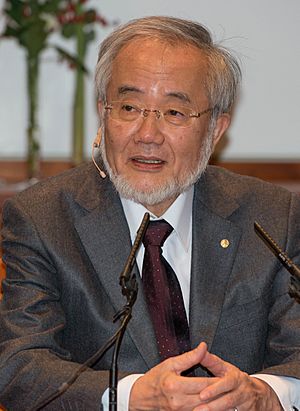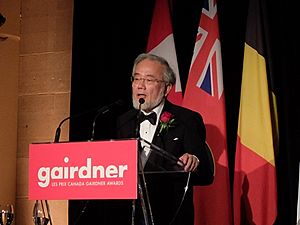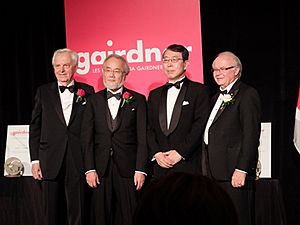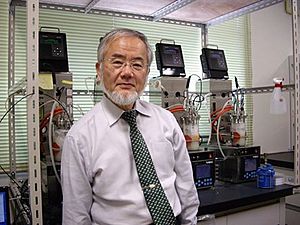Yoshinori Ohsumi facts for kids
Quick facts for kids
Yoshinori Ohsumi
|
|
|---|---|

Ohsumi in 2016
|
|
| Born | February 9, 1945 Fukuoka, Japan
|
| Alma mater | University of Tokyo (BSc, DSc) |
| Known for | Autophagy |
| Awards | Kyoto Prize (2012) Gairdner Foundation International Award (2015) Nobel Prize in Physiology and Medicine (2016) Breakthrough Prize in Life Sciences (2017) |
| Scientific career | |
| Fields | Cell biologist |
| Institutions | Institute of Science Tokyo Tokyo Institute of Technology |
Yoshinori Ohsumi (大隅 良典, Ōsumi Yoshinori, born February 9, 1945) is a Japanese cell biologist. He is famous for his work on autophagy. This is a natural process where cells clean up and recycle their old or damaged parts. It's like a tiny recycling plant inside each of our cells!
Ohsumi is a professor at the Institute of Innovative Research in Tokyo, Japan. He has received many important awards for his discoveries. These include the Kyoto Prize in 2012, the Nobel Prize in Physiology and Medicine in 2016, and the Breakthrough Prize in Life Sciences in 2017. These awards recognized his amazing discoveries about how autophagy works.
Contents
About Yoshinori Ohsumi
Yoshinori Ohsumi was born in Fukuoka, Japan, on February 9, 1945. He studied at the University of Tokyo. He earned his first science degree in 1967 and a higher science degree in 1974.
After finishing his studies in Japan, he moved to New York City. From 1974 to 1977, he worked as a researcher at Rockefeller University. This was a chance for him to learn even more about science.
His Career in Japan
In 1977, Ohsumi returned to the University of Tokyo. He started as a research associate. Over the years, he moved up in his career. He became a lecturer in 1986 and an associate professor in 1988.
In 1996, he moved to the National Institute for Basic Biology, Japan. There, he became a full professor. He also taught at the Graduate University for Advanced Studies from 2004 to 2009.
After 2009, he continued his important research and teaching. He became a professor at the Tokyo Institute of Technology. Even after officially retiring in 2014, he kept working as a professor. Today, he leads the Cell Biology Research Unit at the Tokyo Institute of Technology.
Discovering Autophagy
The idea of "autophagy" was first named by a scientist named Christian de Duve in 1963. But very few scientists studied it back then. Yoshinori Ohsumi started his research on autophagy in 1988.
His work changed everything! During the 1990s, Ohsumi and his team made big discoveries. They studied autophagy in yeast cells. Yeast cells are simple, which makes them great for studying basic cell processes.
Ohsumi's team found out how autophagy looks inside yeast cells. They also found the special genes that cells need for autophagy to happen. These discoveries were super important. They helped other scientists understand how cells clean themselves.
In 2016, Ohsumi received the Nobel Prize in Physiology and Medicine. He won it for his amazing discoveries about how autophagy works. He was the 25th Japanese person to win a Nobel Prize. His wife, Mariko, who is also a professor, worked with him on some of his research.
Awards and Honors
Yoshinori Ohsumi has received many important awards for his scientific work. Here are some of them:
- 2005 – Fujihara Award
- 2006 – Japan Academy Prize
- 2007 – Science Award, Botanical Society of Japan
- 2008 – Asahi Prize
- 2012 – Kyoto Prize in Basic Sciences
- 2013 – Thomson Reuters Citation Laureate
- 2015 – Gairdner Foundation International Award
- 2015 – International Prize for Biology
- 2015 – Keio Medical Science Prize
- 2015 – Person of Cultural Merit
- 2015 – Rosenstiel Award
- 2016 – Wiley Prize in Biomedical Sciences
- 2016 – Dr. Paul Janssen Award for Biomedical Research
- 2016 – Nobel Prize in Physiology and Medicine
- 2016 and 2017 – Asian Scientist 100
- 2017 – Breakthrough Prize in Life Sciences
- 2017 – Honorary doctorate from Kyoto University, Japan
See also
 In Spanish: Yoshinori Ohsumi para niños
In Spanish: Yoshinori Ohsumi para niños
- List of Japanese Nobel laureates
- List of Nobel laureates affiliated with the University of Tokyo
 | Audre Lorde |
 | John Berry Meachum |
 | Ferdinand Lee Barnett |




